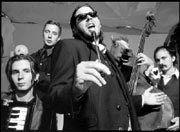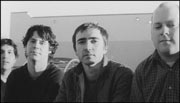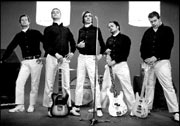BLACK HEART PROCESSION
CARISSA’S WIERD, MAGIC MAGICIANS, PLEASEEASAUR
Showbox, 206-628-3151, $12/$10 adv. all ages, 7 p.m. Wed., Nov. 13
LIKE DOGS AND BABIES, every band needs a name. Unlike kids or canines, however, rock groups are faced with few limits when it comes to propriety, word count, or even good grammar. For every band that goes the familiar animal/vegetable/ mineral route (Doves, Ivy, Pavement), another will choose the nonsensical in-joke (Pearl Jam, Les Savy Fav), the cryptic and verbose (Built to Spill, . . . And You Will Know Us by the Trail of Dead), or the just plain ridiculous (Limp Bizkit, Hoobastank). Black Heart Procession, on the other hand, possess that very rarest of band-name attributes: simple truth in advertising.
The San Diego twosome’s (and then some; additional members rotate) first three albums were just what their moni-ker suggested—bleak and broken funeral parades, trudging gorgeously through some indeterminate dark night of the soul. For those in the mood to wallow along, it was a thing of beauty indeed. But five years on, it seems like even Black Heart Procession have tired of their relentlessly down sound; their latest, Amore del Tropico, swings disarmingly from south-of-the-border exotica and almost rollicking guitar numbers to dusty spaghetti Western- style epics—and tellingly forsakes the disheartened numerical titles of their three previous releases (1, 2, and 3) for one that teases with the promise of sun and sin.
It’s the first time Pall Jenkins and Tobias Nathaniel have ever let the feel of their balmy, palm-tree-strewn hometown slip into BHP’s gray-skies aesthetic. Still, for a band built on broken promises, Amore is no different. The album is actually loosely constructed around a consistent narrative of despair, betrayal, and, obliquely, murder—a story that singer Jenkins says the group plans to take further and more literally in a DVD release they’re working on. Sunshine be damned: “At times, we feel that we’re kind of out of place,” Jenkins muses of his Southern California surroundings. “But it’s probably kind of our escape from it, you know? There are times, like on the first record, where I’ve found some sort of inspiration from living by the ocean, but I really feel that where I’m from doesn’t make too much of a difference to the music. [Though] maybe it does.”
Lyrically, there remains little light in the album. Nearly every track hisses and whispers at its dark subject matter, from the baleful “Broken World” (“I know that you wanna get rid of me/I know that you, you got a plan for me”) to the ominous “A Sign in the Road” (“Did you not hear? Nobody’s coming home/Wasn’t it clear, the writing on the wall?”). Even the song titles hint at some sinister end: “Sympathy Crime,” “The One Who Has Disappeared,” and “Fingerprints.”
But how, then, to account for the band’s bigger, brighter sound? “I think it had to do with us having purchased our own equipment and buying recording equipment,” says Jenkins simply. “Setting up our own recording studio and recording ourselves, then inviting a bunch of different friends to play on the record. It [definitely] took a bit longer to write,” he adds.
In the midst of sessions for Amore, Jenkins and Nathaniel still found time to work with Pinback’s Armistead Burwell Smith and Tom Zinser, their former bandmates in bass-heavy ’90s outfit Three Mile Pilot. “Black Heart’s our thing now, and that’s the main thing,” Jenkins says, “but we’re still all good friends.” In fact, Jenkins says the collective will eventually release another album together, though they’re in no hurry: “We were trying to put a time frame to it, but we just decided to let it be, and it will get done when the timing’s right.” In the meantime, BHP also have tentative plans to co-headline a tour with friends and labelmates Calexico and possibly put out a split EP with them as well. Funny, for a band whose sound so personifies desolation and isolation, the boys of Black Heart don’t seem so alone, after all.









